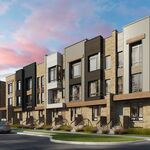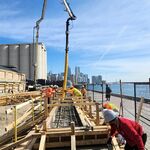Memph
Active Member
Or at least, how much effort should we be putting into that. It seems like a big part of the justification Metrolinks is using to try to sell the Big Move is to fight congestion.
However, if you actually look at the projections, we'd be spending $50 billion on transit (just capital expenditures afaik) and have almost no decrease in congestion. Supposedly, this is to prevent things from getting worse. But will they really get that much worse if we do nothing?
Imagine we stopped all construction of new transportation infrastructure, both roads and transit. Over the next 30 years, the GTA's population is supposed to grow by about 50%, so since we're not building new roads into greenfields, this means the GTA will get 50% denser, both in terms of residential and job density. In order to prevent congestion from getting worse*, people will have to decrease the distance they drive by 33%. Who knows, maybe rising gasoline prices would have caused that to happen anyways. However, since the density went up 50%, that pretty much cancels out the effect of having a smaller driving range (in terms of land area) because the amount of stuff within that driving range will have increased.
It could be similar for transit, people will just use it less (or change where they live) if it gets crowded, maybe more people will more from North York to Downtown and the people living in North York will be the people working in North York.
If we invest in transit, and that causes some people to take transit instead of driving, that will decrease congestion, causing more people to drive... So overall, I don't think transit investments will have a very large impact on transit congestion, just like widening highways also has little effect.
That doesn't mean we shouldn't be investment in new transportation infrastructure, especially transit, but spending tens of billions with the goal of fighting congestion seems like a waste. There are still other goals that might be worthwhile though, like improving transit to encourage people to have fewer cars (which often means one car instead of 2 or 3), which could lead to either less private debt, or more private spending on other things that might be better for the economy. There's also concerns about resiliency in the face of peak oil, and environmental concerns.
*This is a related point, how much worse can congestion get in Toronto? I'm pretty sure that if congestion gets worse, people will just drive less, mitigating much of the increase in congestion.
However, if you actually look at the projections, we'd be spending $50 billion on transit (just capital expenditures afaik) and have almost no decrease in congestion. Supposedly, this is to prevent things from getting worse. But will they really get that much worse if we do nothing?
Imagine we stopped all construction of new transportation infrastructure, both roads and transit. Over the next 30 years, the GTA's population is supposed to grow by about 50%, so since we're not building new roads into greenfields, this means the GTA will get 50% denser, both in terms of residential and job density. In order to prevent congestion from getting worse*, people will have to decrease the distance they drive by 33%. Who knows, maybe rising gasoline prices would have caused that to happen anyways. However, since the density went up 50%, that pretty much cancels out the effect of having a smaller driving range (in terms of land area) because the amount of stuff within that driving range will have increased.
It could be similar for transit, people will just use it less (or change where they live) if it gets crowded, maybe more people will more from North York to Downtown and the people living in North York will be the people working in North York.
If we invest in transit, and that causes some people to take transit instead of driving, that will decrease congestion, causing more people to drive... So overall, I don't think transit investments will have a very large impact on transit congestion, just like widening highways also has little effect.
That doesn't mean we shouldn't be investment in new transportation infrastructure, especially transit, but spending tens of billions with the goal of fighting congestion seems like a waste. There are still other goals that might be worthwhile though, like improving transit to encourage people to have fewer cars (which often means one car instead of 2 or 3), which could lead to either less private debt, or more private spending on other things that might be better for the economy. There's also concerns about resiliency in the face of peak oil, and environmental concerns.
*This is a related point, how much worse can congestion get in Toronto? I'm pretty sure that if congestion gets worse, people will just drive less, mitigating much of the increase in congestion.




